中国文化概论英文版Unit8答案资料
英语中国文化概论课后答案unit1
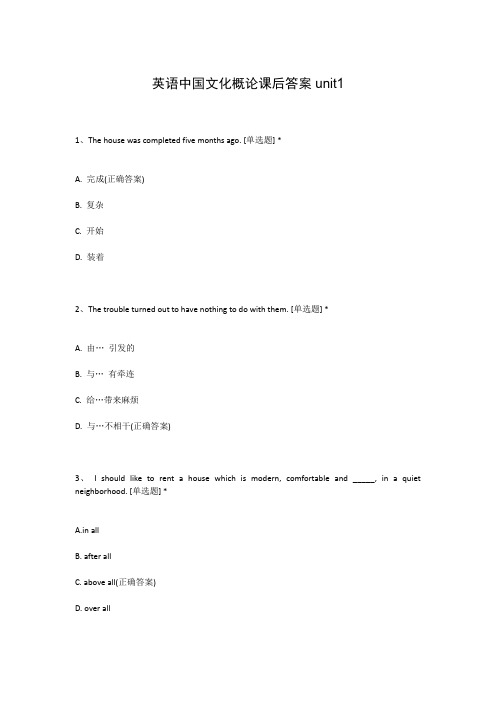
英语中国文化概论课后答案unit11、The house was completed five months ago. [单选题] *A. 完成(正确答案)B. 复杂C. 开始D. 装着2、The trouble turned out to have nothing to do with them. [单选题] *A. 由…引发的B. 与…有牵连C. 给…带来麻烦D. 与…不相干(正确答案)3、I should like to rent a house which is modern, comfortable and _____, in a quiet neighborhood. [单选题] *A.in allB. after allC. above all(正确答案)D. over all4、It was _____ that the policy of reform and opening up came into being in China. [单选题] *A. in the 1970s(正确答案)B. in 1970sC. in the 1970s'D. in 1970's5、I_____you that I had made the right decision. [单选题] *A.ensuredB.insuredC.assured(正确答案)D.for sure6、Some people were born with a good sense of direction. [单选题] *A. 听觉B. 方向感(正确答案)C. 辨别力D. 抽象思维7、—What were you doing when the rainstorm came?—I ______ in the library with Jane. ()[单选题] *A. readB. am readingC. will readD. was reading(正确答案)8、Mr. White likes to live in a _______ place. [单选题] *A. quiteB. quiet(正确答案)C. quickD. quietly9、37.—What will you be ___________?—I'm not sure. Maybe I'll be a doctor like my father. [单选题] *A.right nowB.in the future(正确答案)C.at onceD.at the moment10、During the Spring Festival, people in Northern China usually eat _______ as a traditional Chinese food. [单选题] *A. pizzaB. dumplings(正确答案)C. hamburgersD. noodles11、You could hardly imagine _______ amazing the Great Wall was. [单选题] *A. how(正确答案)B. whatC. whyD. where12、Mary _______ Math. [单选题] *A. is good at(正确答案)B. do well inC. is good forD. is good with13、The language school started a new()to help young learners with reading and writing. [单选题] *A. course(正确答案)B. designC. eventD. progress14、It’s raining heavily outside. Don’t leave _______ it stops. [单选题] *A. whileB. sinceC. until(正确答案)D. when15、Mom is making dinner. It _______ so nice! [单选题] *A. smells(正确答案)B. tastesC. feelsD. sounds16、Julia’s on holiday in Shanghai _______. [单选题] *A. in a momentB. after a momentC. at the moment(正确答案)D. at any moment17、_______ after dinner is good for our health. [单选题] *A. WalksB. Walking(正确答案)C. WalkedD. Walk18、Alice hopes to _______ more friends at her new school. [单选题] *A. visitB. make(正确答案)C. missD. take19、My father and I often go ______ on weekends so I can ______ very well. ()[单选题] *A. swim; swimmingB. swims; swimC. swimming; swimmingD. swimming; swim(正确答案)20、You should _______ fighting with your parents although you may have different ideas from time to time. [单选题] *A. suggestB. enjoyC. avoid(正确答案)D. practice21、You can't see many _____ in a hospital. [单选题] *A. man nurseB. men nurses(正确答案)C. men nurseD. man nurses22、You can distinguish the twins very easily, _____Tom is quite while Jack is active. [单选题] *A. soB. butC. for(正确答案)D. and23、?I am good at schoolwork. I often help my classmates _______ English. [单选题] *A. atB. toC. inD. with(正确答案)24、The blue shirt looks _______ better on you than the red one. [单选题] *A. quiteB. moreC. much(正确答案)D. most25、I used to take ____ long way to take the bus that went by ____ tunnel under the water. [单选题] *A. a, aB. a. theC. a, /(正确答案)D. the, a26、He _______ walks to school, because he lives near school. [单选题] *A. sometimes(正确答案)B. neverC. doesn’tD. don’t27、40.—________ apples do we need to make fruit salad?—Let me think…We need three apples. [单选题] *A.How longB.How oftenC.How muchD.How many(正确答案)28、There is _______ meat in the fridge.Lets go and buy some. [单选题] *A. little(正确答案)B. a littleC. fewD. a few29、I will _______ from Hunan University next year. [单选题] *A. learnB. studyC. graduate(正确答案)D. come30、13.—Will you come to my party?—I am not ________ . [单选题] * A.mindB.sure(正确答案)C.happy D.Sorry。
中国文化概论英文unit1答案
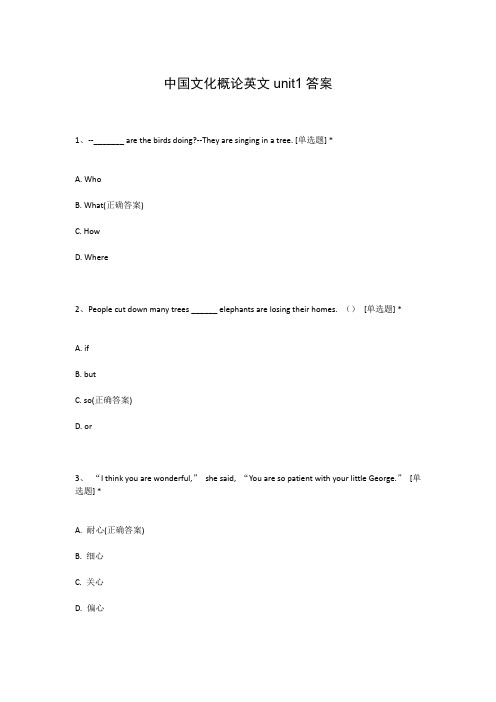
中国文化概论英文unit1答案1、--_______ are the birds doing?--They are singing in a tree. [单选题] *A. WhoB. What(正确答案)C. HowD. Where2、People cut down many trees ______ elephants are losing their homes. ()[单选题] *A. ifB. butC. so(正确答案)D. or3、“I think you are wonderful,”she said, “You are so patient with your little George.”[单选题] *A. 耐心(正确答案)B. 细心C. 关心D. 偏心4、Mum, this T-shirt is much too small for me. Would you buy me a _______ one? [单选题] *A. niceB. largeC. nicerD. larger(正确答案)5、July hardly joins in any class activities,_____? [单选题] *A. does she(正确答案)B. doesn't sheC. didn't sheD. is she6、I used to take ____ long way to take the bus that went by ____ tunnel under the water. [单选题] *A. a, aB. a. theC. a, /(正确答案)D. the, a7、Her ideas sound right, but _____ I'm not completely sure. [单选题] *A. somehow(正确答案)B. somewhatC. somewhereD. sometime8、This kind of work _______ skills and speed. [单选题] *A. looks forB. waits forC. calls for(正确答案)D. cares for9、46.The pants look cool.You can ________. [单选题] *A.try it onB.try on itC.try them on(正确答案)D.try on them10、76.AC Milan has confirmed that the England star David Beckham ()the team soon. [单选题] *A. has rejoinedB. was going to rejoinC. rejoinedD. is to rejoin(正确答案)11、6.—How can we get to the school?—________ bus. [单选题] *A.ToB.OnC.By(正确答案)D.At12、If by any chance someone comes to see me, ask him to leave a _____. [单选题] *A. message(正确答案)B. letterC. sentenceD. notice13、Ships can carry more goods than _____ means of transport. [单选题] *A. the otherB. anotherC. any other(正确答案)D. any14、Mary, together with her children ,_____ some video show when I went into the sitting room. [单选题] *A. were watchingB. was watching(正确答案)C. is watchingD. are watching15、My brother usually _______ his room after school. But now he _______ soccer. [单选题] *A. cleans; playsB. cleaning; playingC. cleans; is playing(正确答案)D. cleans; is playing the16、We need two ______ and two bags of ______ for the banana milk shake.()[单选题]*A. banana; yogurtB. banana; yogurtsC. bananas; yogurt(正确答案)D. bananas; yogurts17、You wouldn't have seen her if it _____ not been for him . [单选题] *A. hasB. had(正确答案)C. haveD.is having18、How lovely a day,()? [单选题] *A. doesn't itB. isn't it(正确答案)C.shouldn't itD.hasn't it19、( )He gave us____ on how to keep fit. [单选题] *A. some advicesB. some advice(正确答案)C. an adviceD. a advice20、Mr. Wang is coming to our school. I can’t wait to see _______. [单选题] *A. herB. him(正确答案)C. itD. them21、53.On your way home, you can buy some fruit, meat, vegetables and ________. [单选题] *A.something else(正确答案)B.else somethingC.everything elseD.else everything22、--Mom, I will not eat fast food this year. Believe me.--If you make a _______, you must keep it. [单选题] *A. jokeB. noiseC. mistakeD. promise(正确答案)23、52.I'm happy to ________ a birthday card from an old friend. [单选题] *A.buyB.makeC.loseD.receive(正确答案)24、24.I often ask my English teacher some questions ________ e-mail. [单选题] * A.by(正确答案)B.inC.forD.with25、—Can you play tennis? —______, but I’m good at football.()[单选题] *A. Yes, I can(正确答案)B. Yes, I doC. No, I can’tD. No, I don’t26、He was proud of what he had done. [单选题] *A. 对…感到自豪(正确答案)B. 对…感到满足C. 对…表示不满D. 对…表示后悔27、There are many beautiful _______ in the wardrobe. [单选题] *A. bookB. dresses(正确答案)C. cell phoneD. grocery28、What he said sounds _______. [单选题] *A. pleasantlyB. nicelyC. friendly(正确答案)D. wonderfully29、The rain is very heavy _______ we have to stay at home. [单选题] *A. butB. becauseC. so(正确答案)D. and30、( ) --------Please take my seat here.-------- __________________________. [单选题]*A. That is nice of you(正确答案)B. I think it is my seatC. No, you sit hereD. I don’t think it’s a good seat.。
《中国文化》英语教程复习题及答案
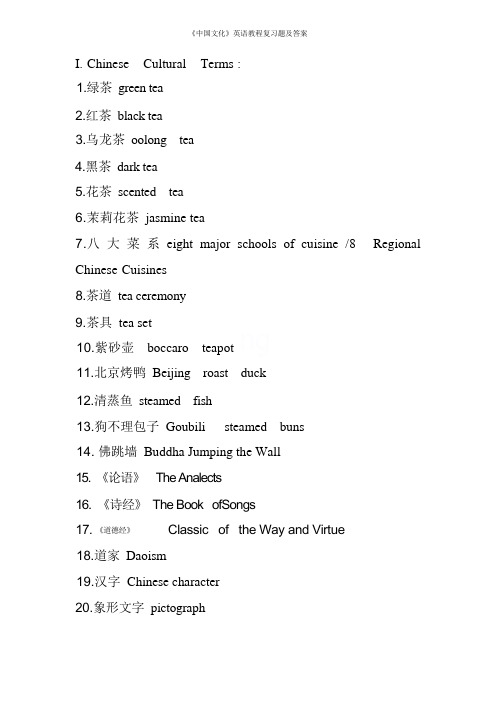
I. Chinese Cultural Terms :1.绿茶green tea2.红茶black tea3.乌龙茶oolong tea4.黑茶dark tea5.花茶scented tea6.茉莉花茶jasmine tea7.八大菜系eight major schools of cuisine /8 Regional Chinese Cuisines8.茶道tea ceremony9.茶具tea set10.紫砂壶boccaro teapot11.北京烤鸭Beijing roast duck12.清蒸鱼steamed fish13.狗不理包子Goubili steamed buns14. 佛跳墙Buddha Jumping the Wall15. 《论语》The Analects16. 《诗经》The Book ofSongs17. 《道德经》Classic of the Way and Virtue18.道家Daoism19.汉字Chinese character20.象形文字pictograph21.甲骨文oracle-bone inscription/ oracle-bone script22.篆文seal character/ seal script23.文房四宝four treasures of study24.丝绸之路the Silk Road25. 海上丝绸之路the Maritime silk road26.一带一路倡议The Belt and Road Initiative27.西域the Western regions28.敦煌石窟the Dunhuang Grottoes29.春秋时期the Spring and Autumn Period30. 方块象形文字the square-shaped pictographic character31. 颜(真卿)体the Yan style32. 民间艺术folk arts33.年画New Year pictures34.剪纸paper cutting /papercuts35.皮影戏shadow play36.苏绣Suhou Embroidery37.造纸术paper making38.印刷术printing39.佛经Buddhist scripture40.行书running script /semi-cursive script41.草书cursive script42.楷书regular script/standard script43.隶书official script/ clerical script44.砚the ink slab/ the ink stone; 墨ink stick45.六艺:礼乐射御书数“six arts” : ritual,music,archery, carriage driving , calligraphy , and mathematics46.毛笔the writing brush47.宣纸xuan paper/ rice paper48.中国书法Chinese calligraphy49.简体字:simplified characters50. 繁体字complex characters/ traditional characters51.中国结Chinese knots52.佛教Buddhism53.国徽national emblem54. 国旗national flag55. 国歌national anthemII. Multiple choices (每题三个选项中选一个最佳答案)1)Which of the following is irrelevant to the pictographic symbols of Chinese characters? (下列哪项与汉字的象形符号无关?)Aspiration. 吸Imagination.想象Creativity.创造力Allusion.典故2) Which of the following statements is true of the name of Fudan Universit(y关于复旦大学的名称,下列哪个陈述是正确的?)The characters both stand for "the sun rising on the horizon"这.些字符都代表着“太阳在地平线上升起”The name is taken from a Chinese classical poem.这个名字取自中国古典诗歌The name encourages the students to get up early in the morning.这个名字鼓励学生早上早起The characters are intended to tell the students to make progress day by day.这些字旨在让学生们一天天地进步3) Which of the following languages mostly consists of language pictures(下列语言中哪一种主要由语言图片组成?) ? B___Mandarin Chinese. 普通话Hieroglyphs of ancient Egypt.古埃及的象形文字Oracle-bone inscription. 甲骨文Seal characters.篆书4) The symbol for “swimming” is closest to (“游泳”的符号最接近的是)oracle-bone inscription 甲骨文Mandarin Chinese 普通话seal characters 篆书none of the above 没有选项5)The symbol for “athletics” contains the ingredients of (“运动”的符号包含了)dancing and running 跳舞、跑步running and swinging 跑步和摆动dancing and swinging 跳舞和摆动triathlon and football 铁人三项和足球6)All the following are the titles of Confucius excep(t以下孔子的头衔除了) ___.Ban educator 一个教育家A biologist 一个生物学家A scholar 有识之士A philosopher 一个哲学家7)The expression “filial piety” most probably means being (“孝”的意思很可能是指) ___.DLoyal to the state 忠于国家Obedient to sister(s) 听姐姐的话Responsible for the family 对家庭负责Dutiful to parents 孝顺父母8)Which of following can best describe Confucius’ view on the relationship between man and nature (下面哪一个最能说明孔子对人与自然关系的看法?) ___.D Brothers 兄弟Husband and wife 夫妇Doctor and patient 医生和病人Mother and son 母子9)Through burial and ancestral worship rituals,people can learn that (通过丧葬和祭祖仪式,人们可以了解到。
A Glimpse of Chinese Culture《中国文化概论》讲义-chapters 1-8
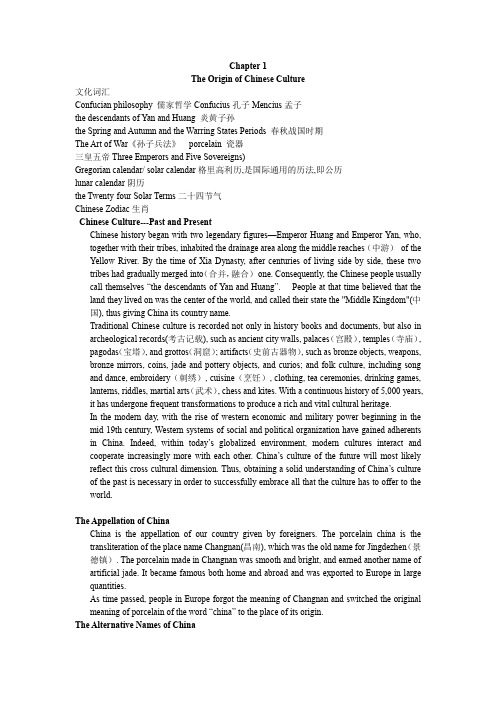
Chapter 1The Origin of Chinese Culture文化词汇Confucian philosophy 儒家哲学Confucius孔子Mencius孟子the descendants of Yan and Huang 炎黄子孙the Spring and Autumn and the Warring States Periods 春秋战国时期The Art of War《孙子兵法》porcelain 瓷器三皇五帝Three Emperors and Five Sovereigns)Gregorian calendar/ solar calendar格里高利历,是国际通用的历法,即公历lunar calendar阴历the Twenty-four Solar Terms二十四节气Chinese Zodiac生肖Chinese Culture---Past and PresentChinese history began with two legendary figures—Emperor Huang and Emperor Yan, who, together with their tribes, inhabited the drainage area along the middle reaches(中游)of the Yellow River. By the time of Xia Dynasty, after centuries of living side by side, these two tribes had gradually merged into(合并,融合)one. Consequently, the Chinese people usually call themselves “the descendants of Yan and Huang”.People at that time believed that the land they lived on was the center of the world, and called their state the "Middle Kingdom"(中国), thus giving China its country name.Traditional Chinese culture is recorded not only in history books and documents, but also in archeological records(考古记载), such as ancient city walls, palaces(宫殿), temples(寺庙), pagodas(宝塔), and grottos(洞窟); artifacts(史前古器物), such as bronze objects, weapons, bronze mirrors, coins, jade and pottery objects, and curios; and folk culture, including song and dance, embroidery(刺绣), cuisine(烹饪), clothing, tea ceremonies, drinking games, lanterns, riddles, martial arts(武术), chess and kites. With a continuous history of 5,000 years, it has undergone frequent transformations to produce a rich and vital cultural heritage.In the modern day, with the rise of western economic and military power beginning in the mid-19th century, Western systems of social and political organization have gained adherents in China. Indeed, within today’s globalized environment, modern cultures interact and cooperate increasingly more with each other. China’s culture of the future will most likely reflect this cross-cultural dimension. Thus, obtaining a solid understanding of China’s culture of the past is necessary in order to successfully embrace all that the culture has to offer to the world.The Appellation of ChinaChina is the appellation of our country given by foreigners. The porcelain china is the transliteration of the place name Changnan(昌南), which was the old name for Jingdezhen(景德镇). The porcelain made in Changnan was smooth and bright, and earned another name of artificial jade. It became famous both home and abroad and was exported to Europe in large quantities.As time passed, people in Europe forgot the meaning of Changnan and switched the original meaning of porcelain of the word “china” to the place of its origin.The Alternative Names of China⏹Chixian, Shenzhou(赤县、神州)⏹Jiuzhou (九州)⏹Hua ( 华)⏹Huaxia(华夏)⏹Zhonghua(中华)⏹Hainei(海内)Chinese MythologyChinese Mythology is a collection of cultural history, folktales(民间故事), and religions that have been passed down in oral or written form. Chinese mythology is similar to modern religion in that they both believe in relationships between mankind and a higher power.Historians have conjectured(推测)that Chinese mythology began in 12th century BC (close to the time of the Trojan War 特洛伊战争). The myths and legends were passed down in oral form for over a thousand years, before being written down in early book such as Shui Jing Zhu and Shan Hai Jing.The classification of myth神话的分类Creation myth 创世神话:Nvwa Created Man(女娲造人)Hero myth 英雄神话:Houyi Shooting the Sun(后羿射日)War myth 战争神话:Yellow Emperor Tackled Human-God(黄帝擒蚩尤)Cultural MosaicHeavenly Stems and Earthly BranchesThe standard Gregorian calendar is generally referred to as the solar calendar in China. The traditional Chinese lunar calendar, also known as the Jiazi calendar, counts the years in sixty-year cycles by combining two series of numbers---the 10 Heavenly Stems and 12 Earthly Branches.The Twenty-four Solar TermsThe traditional Chinese lunar year is divided into twenty-four solar terms, according to the position of the sun on the ecliptic in relationship to the earth. The solar terms designate agricultural periods, and can predict changing seasonal conditions, temperature, and weather throughout the course of the year. They are extremely important to agricultural production.Changes in the four seasons are determined by eight solar terms:立春( the Beginning of Spring),春分( the Spring Equinox ),立夏(the Beginning of Summer ),夏至(the Summer Solstice),立秋(the Beginning of Autumn),秋分( the Autumnal Equinox),立冬( the Beginning of Winter),冬至(the Winter Solstice )Changes in temperature are indicated by five solar terms:小暑Slight Heat ,大暑Great Heat ,处暑the Limit of Heat ,小寒Slight Cold ,大寒Great ColdChanging weather conditions are indicated by seven solar terms:雨水Rain Water ,谷雨Grain Rain ,白露White Dew ,寒露Cold Dew,霜降Frost's Descent ,小雪Slight Snow ,大雪Great Snow .Recurring natural phenomena are indicated by four solar terms:惊蛰the Waking of Insects ,清明Pure Brightness ,小满Grain Full,芒种Grain in EarChinese ZodiacIn ancient times, our ancestors counted the years with 10 heavenly stems and 12 earthly branches. Although this was scientific, most people were illiterate and could not memorize or calculate easily. Thus the animals that influenced people's lives were chosen to symbolize the terrestrial branches: the rat, ox, tiger, rabbit, dragon, snake, horse, sheep, monkey , rooster, dog and pig.Chapter 2 Culinary Culture文化词汇culinary厨房的,烹饪的;烹调用的cuisine烹饪,烹调法;菜肴main food主食,主粮(staple food )Fire temperature火候food tonic 食补“Food is the first necessity of the people”(“民以食为天。
中国文化概论英文版Unit8答案
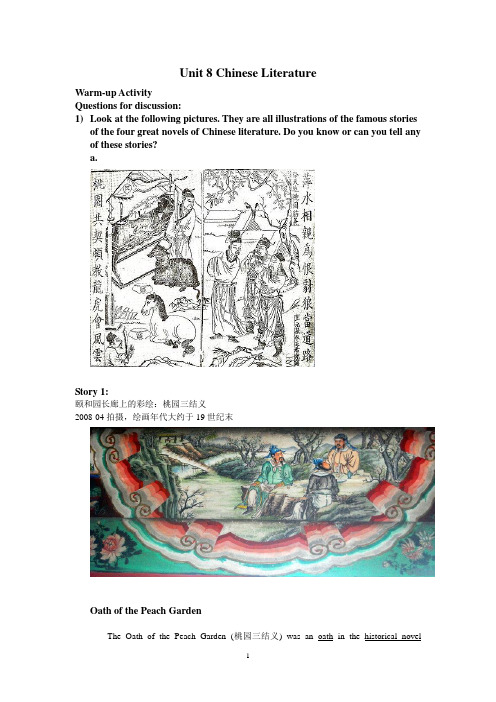
Unit 8 Chinese LiteratureWarm-up ActivityQuestions for discussion:1)Look at the following pictures. They are all illustrations of the famous storiesof the four great novels of Chinese literature. Do you know or can you tell any of these stories?a.Story 1:颐和园长廊上的彩绘:桃园三结义2008-04拍摄,绘画年代大约于19世纪末Oath of the Peach GardenThe Oath of the Peach Garden (桃园三结义) was an oath in the historical novelRomance of the Three Kingdoms, by which the three warriors Liu Bei, Guan Y u, and Zhang Fei became sworn brothers in a ceremony amid peach blossom trees. The original goal of the Peach Garden Oath was to protect the Han Dynasty from the Yellow Turbans. This act bound the three key men of the future Shu-Han Kingdom of China and is often alluded to as a symbol of fraternal loyalty. Nothing in historical records suggest such an event happened, though the three were noted to be close, to the point of sharing the same bed.The oath, as it appears in the Wikisource translation of Romance of the Three Kingdoms/Chapter 1, was this:When saying the names Liu Bei, Guan Yu and Zhang Fei, although the surnames are different, yet we have come together as brothers. From this day forward, we shall join forces for a common purpose, and come to each other's aid in times of crisis. We shall avenge the nation from above, and pacify the citizenry from below. We seek not to be born on the same day, in the same month and in the same year. We merely hope to die on the same day, in the same month and in the same year. May the gods of heaven and earth attest to what is in our hearts. If we should ever do anything to betray our friendship, may the gods in heaven strike us dead.In many other translations, only the section dealing with "dying on the selfsame day" is present. However, the three brothers do not die on the same day: Guan Yu is executed by Sun Quan, Zhang Fei is assassinated by his own men whom he treated with cruelty, and Liu Bei dies of illness after the disastrous attempts to avenge Guan Yu and reclaim the province of Jing.The oath inspired the present day secret societies in Chinese communities, such as the Triad, to use a similar ritual when swearing in new members. "Though not born on the same day of the same month in the same year, we hope to die so" — the phrase the three brothers made during the oath —had also become popular among the present day secret society members. (392 words)()Story 2:颐和园长廊彩绘中的徐庶荐诸葛(三顾茅庐)故事2008-04拍摄,绘画年代大约于19世纪末。
最新《中国文化》英语教程复习题及答案资料

《中国文化》英语教程复习题及答案I. Chinese Cultural Terms : 1.绿茶green tea 2.红茶black tea 3.乌龙茶oolong tea 4.黑茶dark tea 5.花茶scented tea 6.茉莉花茶 jasmine tea7.八大菜系eight major schools of cuisine /8 Chinese Cuisines 8.茶道tea ceremony 9.茶具 tea set 10.紫砂壶 boccaro teapot 11.北京烤鸭Beijing roast duck 12.清蒸鱼steamed fish13.狗不理包子Goubili steamed buns 14. 佛跳墙Buddha Jumping the Wall 15.《论语》 The Analects 16.《诗经》The Book of Songs17.《道德经》 Classic of the Way and Virtue 18.道家 Daoism19.汉字Chinese character xx年画New Year pictures 34.剪纸paper cutting /papercuts 35.皮影戏shadow play 36.苏绣 Suhou Embroidery 37.造纸术paper making 38.印刷术printing 39.佛经Buddhist scripture40.行书 running script /semi-cursive script 41.草书 cursive script42.楷书 regular script/standard script43.隶书 official script/ clerical script 44.砚the ink slab/ the ink stone; 墨ink stick45.六艺:礼乐射御书数“six arts”: ritual,music,archery, carriage driving , calligraphy , and mathematics 46.毛笔the writing brush 47.宣纸xuan paper/ rice paper 48.中国书法Chinese calligraphy 49.简体字: simplified characters50. 繁体字complex characters/ traditional characters 51.中国结 Chinese knots 52.佛教 Buddhism 53.国徽 national emblem 54. 国旗 national flag 55. 国歌 national anthemII. Multiple choices1)Which of the following is irrelevant to the pictographic symbols of Chinese characters? ___A Aspiration. 吸 ? Imagination.想象 ? Creativity.创造力 ? Allusion.典故2) Which of the following statements is true of the name of Fudan University___DThe characters both stand for \这些字符都代表着“太阳在地平线上升起”The name is taken from a Chinese classical poem.这个名字取自中国古典诗歌The name encourages the students to get up earlyin the morning.这个名字鼓励学生早上早起The characters are intended to tell the studentsto make progress dayby day.这些字旨在让学生们一天天地进步3) Which of the following languages mostly consistsof language pictures? B___Mandarin Chinese. 普通话Hieroglyphs of ancient Egypt.古埃及的象形文字 ? Oracle-bone inscription. 甲骨文 ? Seal characters.篆书4) The symbol for “swimming” is closest to ___.Coracle-bone inscription甲骨文? Mandarin Chinese普通话 ? seal characters 篆书? none of the above没有选项5)The symbol for “athletics”contains theingredients of ___.Adancing and running跳舞、跑步 ? running and swinging 跑步和摆动 ? dancing and swinging 跳舞和摆动 ? triathlon and football铁人三项和足球6)All the following are the titles of Confucius except ___.Ban educator一个教育家 ? A biologist 一个生物学家 ? A scholar 有识之士A philosopher一个哲学家7)The expression “filial piety” most probably means being ___.DLoyal to the state忠于国家Obedient to sister(s) 听姐姐的话Responsible for the family 对家庭负责 Dutiful to parents孝顺父母8)Which of following can best describe Confucius’view on the relationship between man and nature ___.DBrothers兄弟Husband and wife 夫妇Doctor and patient 医生和病人 Mother and son母子 9)Through burial and ancestral worship rituals,people can learn that ___.BNature is lifeless so it will never die自然是没有生命的,所以它永远不会死。
中国文化简介(英文版)课后习题答案2

中国文化简介(英文版)课后习题答案2Chapter6—chapter8Chapter 61.1) d 2) d 3) d 4) d2.5) Feng, Ya, Song, Fu, Bi, Xing6) The Classic of Poetry; The Classic of History; The Classic of Rites; The Classic of Rites; The Classic of Changes; The Spring and Autumn Annals.7) Feng (Ballads); Ya (Odes); Song (Sacrificial Songs)3.8) a. The Great Learningb. The Analects of Confucius9) a. The Doctrine of the Meanb . The Classic of History10) a. The Classic of Changesb. The Four Books and Five Classics4.11) “Confucius Way of the Heart”means if everyone makes strict demands onhimself/herself, and does everything according to the Confucian rites, then the relations between the king and the minister, the father and the son will eventually be harmonized, and the society will go smoothly.12) “To know something is not so good as to like it; to like it is not so good as todelight in it.” It means a person who prefers it can learn better than one who merely understands it; but a person who delights in it learns even better than one who only prefers it.5. 略Chapter 71 Multiple choice (choose the best answer).1) a 2) b 3) a 4) a2 Fill in the blanks.5)controlling flood, Yv the Great, Shun6)Pan Gu, Nv Wa, her own model, yellow clay3 Translate the following terms into English7)a. the descendants of Yan and Huang b. Yv the Great controlling the flood8)a. the Eight Immortals crossing the sea. b. Nv Wa creating man9)a. Pan Gu creating the world b.Kua Fu chasing the Sun4 Answer the following questions.10)Huang Di is resourceful in invention as well as in war and is credited with the invention of many things, like carts and boats, clothes, houses, writing and silkworm breeding and Silk weaving. Yan Di is credited with the invention of farming and medicine. He invented the wooden plow and taught people how to treat diseases. Wars urged the mixture and the assimilation of different tribes and eventually formed a tribal alliance of Huang Di and Yan Di. Traditions has it that Chinese civilization originated from the era of Huang Di and Yan Di, for they are the ancestors of the Chinese people. That is why the Chinese call themselves the descendants of Yan and Huang.11)略5 Retell the stories with the help of the following pictures.略Chapter 81.1) a 2)d 3)d 4) a2.5) the guti verse forms, jinti verse forms, classical, verse form, moder6) Shijing7) Li Sao8) Sage Poet, the greatest realist poet9) Su Shi, Li Qingzhao3.10) a. Tang Poems b. Songci11) a. yuanqu b. Chuci4.12) Yuefu originally referred to the “music bureau” in the Han Dynasty, responsible for collecting or writing poems, folk songs and ballads, and having them set to music. Later, poems, folk songs and ballads collected and compiled by yufu were given the name Yuefu.13) Ci is a kind of poetry written to certain tunes with strict tonal patterns and rhyme schemes, in fixed numbers of lines and words, originated in Tang Dynasty and fully developed in Song Dynasty.14) Apart from the above verse forms, there is also Fu, it’s something between poetry and prose, similar to rhapsody: a descriptive poem, and much cultivated from Han times to the Six Dynasties. Examples are Su Shi's “Fu on the Red Cliff”, Ban Gu’s Rhapsody on Two Capitals”, etc.5. 略。
外教社2023新思路英语专业系列教材:阅读教程:中国文化教案Unit 8

Unit 8China in the Mirror:The Perspectives of the Western LiteratiObjectives•To examine, understand and appreciate the traditional Chinese cultural characteristics by reading texts written by several influential Western intellectuals of different national, cultural, and historical backgrounds from a comparative perspective.•To develop intensive reading skills through reading, comprehending, and discussing the text excerpted from William Temple’s long article “Of Heroic Virtue.”•To develop speed reading skills through reading three passages, namely Voltaire’s short story titled “A Conversation with a Chinese,” an excerpt from the conclusion of Richard Wilhelm’s book The Soul of China, and an excerpt from Bertrand Russell’s work The Problem of China. •To develop extensive reading skills through reading Bertrand Russell’s work The Problem of China after class.•To expand the English vocabulary of Chinese culture in general and improve related language skills.•To develop critical thinking, independent research skills, communication capability, and writing skills related to Chinese culture.Section 1: Reading Map阅读导图:本单元主要取材于近现代西方著名公共知识分子对中国文化的书写,与第一单元首尾呼应。
- 1、下载文档前请自行甄别文档内容的完整性,平台不提供额外的编辑、内容补充、找答案等附加服务。
- 2、"仅部分预览"的文档,不可在线预览部分如存在完整性等问题,可反馈申请退款(可完整预览的文档不适用该条件!)。
- 3、如文档侵犯您的权益,请联系客服反馈,我们会尽快为您处理(人工客服工作时间:9:00-18:30)。
精品文档Unit 8 Chinese Literature Warm-up ActivityQuestions for discussion:1)Look at the following pictures. They are all illustrations of the famous stories of the four great novels of Chinese literature. Do you know or can you tell any of these stories?a.Story 1:颐和园长廊上的彩绘:桃园三结义2008-04拍摄,绘画年代大约于19世纪末精品文档.精品文档Oath of the Peach Gardennovel historical in the 桃园三结义) was an oath the The Oath of Peach Garden (u, and Zhang Romance of the Three Kingdoms, by which the three warriors Liu Bei, Guan YFei became sworn brothers in a ceremony amid peach blossom trees. The original goal of thePeach Garden Oath was to protect the Han Dynasty from the Yellow Turbans. This act bounda to as and is often alluded the key men of future Shu-Han Kingdom of China the threehappened, an event records suggest such of symbol fraternal loyalty. Nothing in historicalthough the three were noted to be close, to the point of sharing the same bed.Three the of Romance of it as appears in the Wikisource translation The oath,Kingdoms/Chapter 1, was this:are surnames although the Guan Yu and Zhang Fei, saying When the names Liu Bei,different, yet we have come together as brothers. From this day forward, we shall join forcesfor a common purpose, and come to each other's aid in times of crisis. We shall avenge thenation from above, and pacify the citizenry from below. We seek not to be born on the sameday, in the same month and in the same year. We merely hope to die on the same day, in thesame month and in the same year. May the gods of heaven and earth attest to what is in our hearts. If we should ever do anything to betray our friendship, may the gods in heaven strikeus dead.In many other translations, only the section dealing with dying on the selfsame day ispresent. However, the three brothers do not die on the same day: Guan Yu is executed by Sun Quan, Zhang Fei is assassinated by his own men whom he treated with cruelty, and Liu Beithe province of dies of illness after the disastrous attempts to avenge Guan Yu and reclaimJing.The oath inspired the present day secret societies in Chinese communities, such as theTriad, to use a similar ritual when swearing in new members. Though not born on the same the phrase the three brothers —day of the same month in the same year, we hope to die so society secret present among the day become —made during the oath had also popular)(392 wordsmembers.)(/wiki/Oath_of_the_Peach_GardenStory 2:颐和园长廊彩绘中的徐庶荐诸葛(三顾茅庐)故事2008-04拍摄,绘画年代大约于19世纪末精品文档.精品文档Three Visits to the Thatched CottageAfter they had become sworn brothers at Taoyuan, Liu Bei, Guan Yu and Zhang Fei madeit to do it would be impossible the to restore Han Dynasty. But they felt that concerted efforts after one battle alliance later won help the of a smart adviser. The Liu-Guan-Zhang without opposing the to surrender to Shu. But before long, Xu had the another thanks to advice of Xu troops. Cao by the mother who was abducted of his of camp Cao Cao in order to save the life Before he left, Xu Shu recommended Zhuge Liang to the brothers.Accompanied by Guan Yu and Zhang Fei, Liu Bei went to Wolonggang in Longzhong in the hope of inviting Zhuge Liang to be their military adviser. But Zhuge's servant said: The Mentor left in the morning. Liu Bei asked the servant to forward to Zhuge Liang his message that thebrothers had come to visit him. After that, Liu rode his horse away, returning home sullenly. A few days later when he learned that Zhuge Liang was at home, Liu Bei went for another visit along thatched his reading books at said: Fei. The servant The Mentor is Zhang with Guan Yu and cottage. Liu requested to see him. When they learned that the one reading books at the thatched cottage was not Zhuge Liang himself but his brother Zhuge Jun, the Liu-Guan-Zhang brothers lefta letter to express their admiration and then braved heavy snows to return home.Not long after they returned to their barracks at Xinye, Liu Bei wanted to visit Zhuge Liang'su dissuaded Liu from going by saying that perhaps Zhuge thatched cottage once more. But Guan YLiang was not as smart as expected and that he was simply dodging the visiting brothers for that. Zhang Fei said: You don't need to go. I'll tie him up and force him to come and see you instead.his one of bent of King Wen on visiting story brothers telling time lost Liu Bei no in his thesubjects called Jiang Ziya. Liu, Guan and Zhang, therefore, paid a third visit to Wolonggang. Theyhad no sooner arrived than the servant said: The Mentor is sleeping. Liu Bei waited until ZhugeLiang was awake and dressed . Finally, he consented to see the brothers. Liu Bei paid three visitsto the thatched cottage without complaint. He finally succeeded in inviting Zhuge Liang to be his military adviser and to help the brothers in their cause. (416 words)三顾茅庐《三国演义》中的故事。
